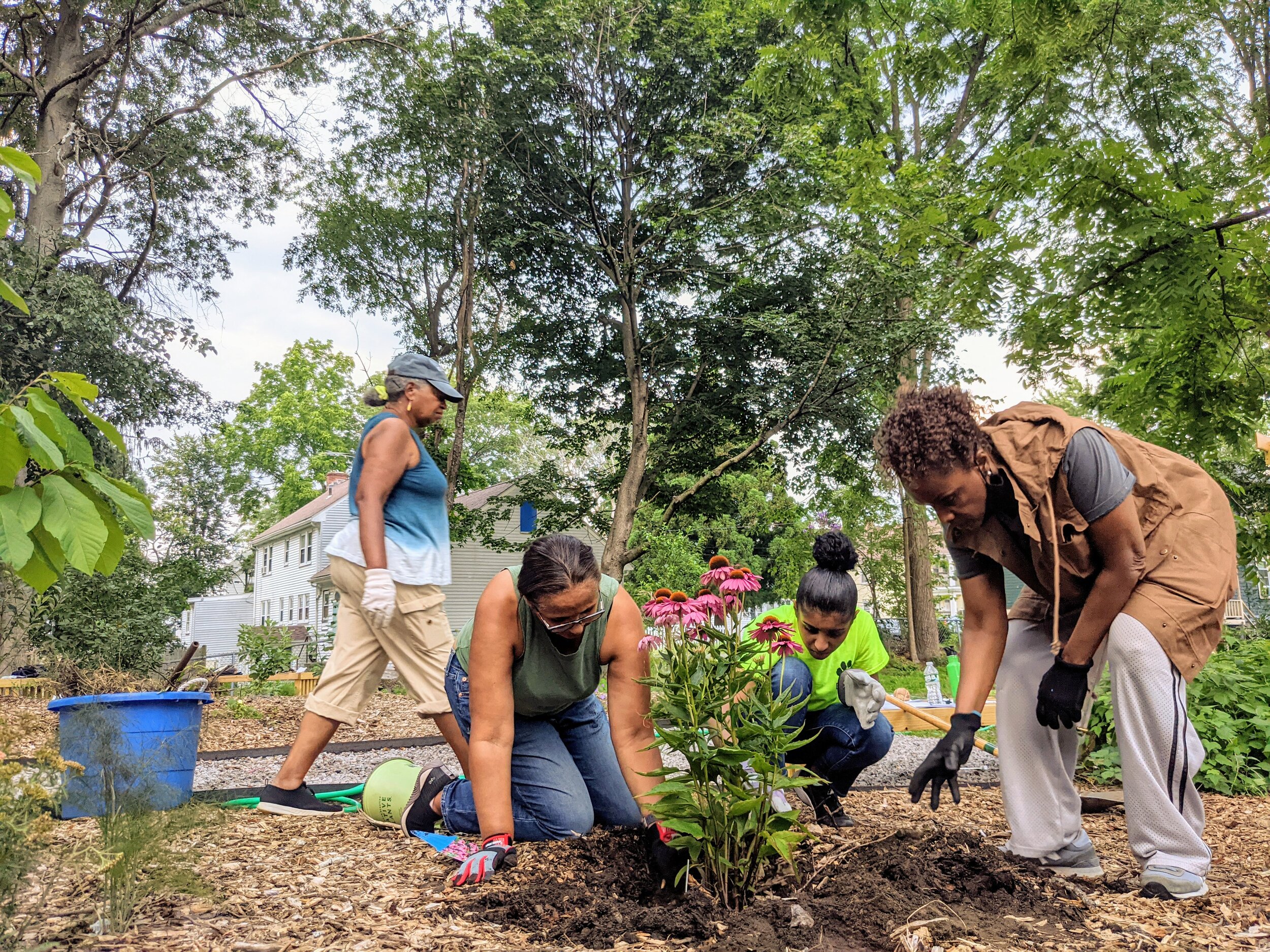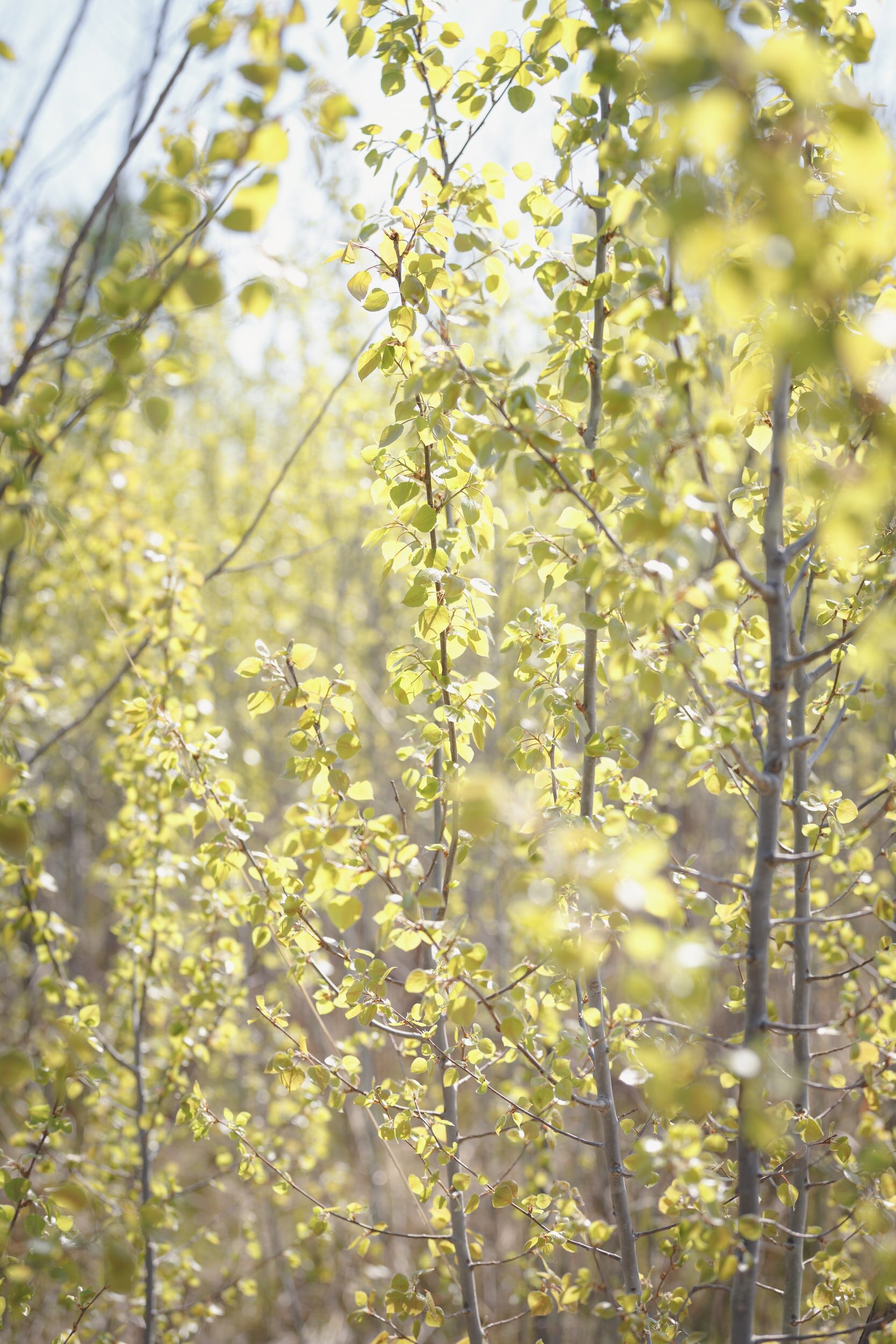
Impact
PAST ANNUAL REPORTS
INCREASED GREEN SPACE EQUITY
Boston’s history of racist mortgage lending practices (such as redlining) has led to significant disparities between white Bostonians and Bostonians of color, including:
a 20% disparity in parkland
a 40% disparity in trees.
Our food forests are intentionally positioned in Boston neighborhoods that have historically been under-invested in with green infrastructure. These sites directly contribute to increased green space equity in Boston.
Once established, our food forest parks are available to everyone — no prerequisites, no wait lists, no fees. We believe that land equity goes beyond neighborhood placement to include actual, tangible accessibility.
INCREASED RESILIENCY AGAINST RISING TEMPERATURES
The City of Boston’s Preparing for Heat Report warns that “Boston is experiencing increased temperatures and extreme heat events due to climate change... [and] our most vulnerable residents suffer an unfair heat burden.”
Because neighborhoods with a history of redlining (Dorchester, Mattapan, Roxbury, etc.) lack equitable green space and tree canopy, these areas experience a 7.5 degree disparity in daytime temperature when compared to more forested areas in Boston.
This is why climate justice is a racial justice issue in Boston. It is also why BFFC centers our work in neighborhoods where investment in green infrastructure has historically not been prioritized.
STRONGER & MORE CONNECTED COMMUNITIES
As of 2025, the Boston Food Forest Coalition includes 12 unique stewardship teams spanning across eight Boston neighborhoods, with new teams forming as new parks enter construction.
Each team in our coalition includes anywhere from 5-15 dedicated volunteers from the surrounding communities, all of whom are the core team of caretakers for their space.
The experience of working collaboratively as a team and alongside the hundreds of annual BFFC volunteers creates more community cohesion within and across Boston neighborhoods, and provides opportunity for people to joyfully care for and engage with nature.
Together, we are weaving a network of mutual aid to support and strengthen our communities and neighborhoods.
INCREASED DIVERSITY AMONG CLIMATE LEADERS
As of 2025, 73% of our stewardship team leaders are women, and 47% are leaders of color.
Diverse leadership within individual teams invites more diversity into the urban climate movement as a whole. BFFC knows that a diversity of opinions, life experience, and types of wisdom strengthens the movement and our work tremendously.
Beyond stewardship teams, BFFC collaborate with hundreds of neighborhood leaders and volunteers each year, and welcomes thousands of visitors to our events and our food forest parks.
INCREASED FOOD AUTONOMY ACROSS NEIGHBORHOODS
Food forest design incorporates fruit and nut trees, fruiting shrubs, annual crops, herbs and other perennial edibles into the landscape.
Because food forests in our coalition are designed with neighbor leadership, input, and vision at the center, neighbors have a say in which type and how many edible species are incorporated into their parks. This control builds food autonomy into Boston’s food system by supporting community members to produce healthy, culturally-relevant food in their neighborhoods.
And, as edible species across the coalition grow and produce food, neighbors have access to more fresh fruit, berries, nuts, and other food sources. Food access is a critical component of food autonomy.
Some sites in the coalition, like the Old West Church Food Forest and the Ellington Community Garden, donate surplus produce to shelters, elder care facilities, churches, and neighbors in need. We will begin to measure these donation amounts in future years.
Food access and autonomy is a big part of community resilience. We work alongside many others in the food justice movement to increase accessibility and equity within Boston’s food systems.
130,000+ SQUARE FEET OF URBAN LAND CONSERVED
To date, BFFC parks collectively add up to over 130,000 total square feet of Boston land conserved. These parcels of land would otherwise be developed and built upon, or neglected and forgotten.
Under the care of BFFC stewards, volunteers, neighbors, and partner organizations, these 130,000+ square feet of land (and growing!) have been and continue to be transformed into thriving forest gardens, enriching Boston neighborhoods and communities.
This land will perpetually remain natural, food-producing oases for future generations to enjoy and sustain.
525+ INDIVIDUAL FRUITING TREES & SHRUBS PLANTED
To date, we have planted over 525 fruiting trees and shrubs throughout the eight Boston neighborhoods in which our sites reside. Each year, that number continues to grow.
Trees create cooling canopy for urban neighborhoods and purify the air we breathe. They help mitigate soil erosion, and reduce water runoff that could otherwise lead to flooding. They provide habitat for many species of wildlife, some of which are endangered. They provide a place for children to play and connect with nature.
And, the City of Boston’s Open Space & Recreation Report makes it clear that bolstering the city’s green infrastructure systems can help us withstand and temper the impacts of climate change, and thus strengthen “the future health, resilience and livability of our city.”
With every tree or shrub planted and every food forest established, we add cooling canopy to otherwise exposed spaces, thus increasing Boston’s resiliency in the face of climate change-induced temperature spikes while increasing food autonomy in our neighborhoods.
25+ EDUCATIONAL WORKSHOPS PER YEAR
BFFC supports stewardship teams by teaching specific skills and general permaculture and ecological knowledge through on-site workshop classes.
Workshop topics include fruit tree care, soil remediation, plant identification, herbalism, perennial edible cooking, nut processing, and more. Classes are led by community educators and experts in the fields of ecological land management, permaculture, herbalism, and more.
Our educational offerings are responsive to park needs, with the overall goal of supporting stewardship teams to effectively care for, preserve, and protect their food forests.
REDUCING CARBON IN THE ATMOSPHERE
Research shows that just one tenth of an acre of land, when managed with regenerative permaculture techniques, can sequester up to 1 ton of carbon in the soil over the course of a year.
Our food forests utilize regenerative permaculture practices, like utilizing nitrogen-fixing plant species, covering bare soil with wood chips or mulch, and incorporating trees into each food forest to stabilize the soil.
In the face of a warming climate, removing as much carbon from the atmosphere as possible is a small step in caring for the planet.
30 Food Forests by ‘30
We have big ambitions for the next five years and beyond.
By 2030, we plan to break ground on 30 total food forests across our coalition.
Within those sites and communities, BFFC will continue to engage with and activate neighborhood leadership, who will continue the work of sustaining perennial food gardens that teach climate resilience and build cross-cultural, intergenerational community connections.
We hope you’ll become a part of our mission to increase climate resilience, community cohesion, and equity across Boston.

“These food forests are a real treasure in the neighborhood, for the neighborhood. And they should give us hope.”
— June Joseph, Founding Steward of the Edgewater Food Forest at River Street









